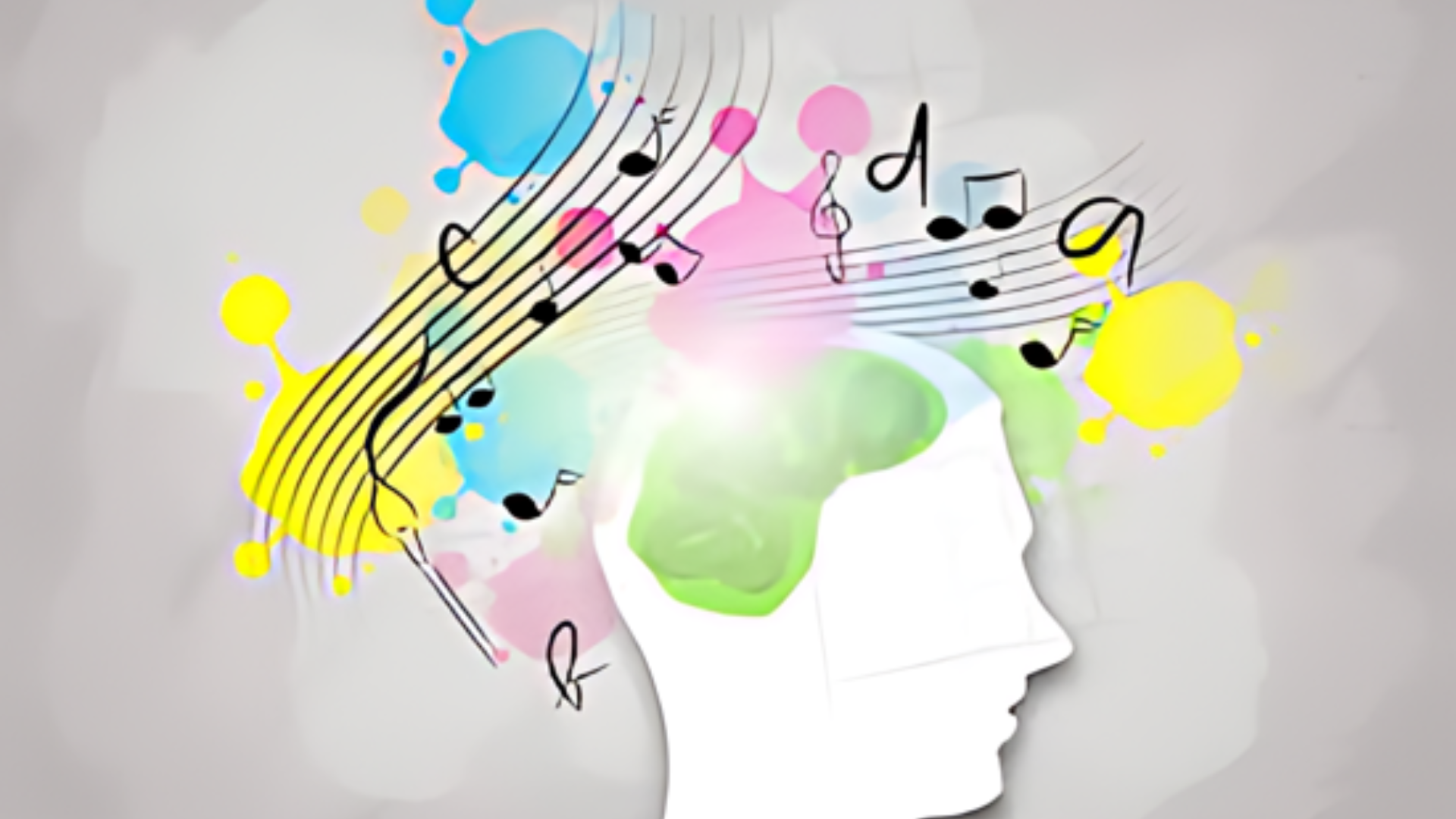“Choosing the right music is not just about what you like but also about what matches your personality.”
Music has been a very important part of our lives since a very long time. In the labyrinth of human experience, music exists as a language that transcends the barriers of words, reaching deep into the soul with melodies that resonate across time and space. Music, has been, for us humans, a constant companion for as long as one can remember, guiding us through moments of joy, sorrow, and everything in between.
Now, imagine a space where this music, its melodies serve as measure to soothe troubled minds, where rhythms synchronize with the beating of our hearts, and where lyrics whisper solace to weary souls. Music therapy, is an art form of therapy, as old as humanity itself, yet, it is a continuously growing and evolving field, unfolding in its capacity to heal and transform.
An important part of psychology, music therapy is a therepeutic approach that uses the naturally mood lifting properties of music to help improve people’s mental health. This form of therapy has been studied for years and is a scientifically proven method to help deal mental health issues. It is extremely helpful for people dealing with several mental health problems. However, it is not just limited to mental health but it also helps in dealing with physical health issues, including heart diseases, arthritis, diabetes and several others.
“Music targets emotion”
Anita Gulwani, a certifed Music Therapist and founder of Musical Healings, states that music includes vocals, beats as well as instruments and what people like about certain music and the genre of music that they listen to the most, highly depends on the kind of personality they have. Everybody incorporates music in their daily life in some or the other form, be it singing, playing instruments or just simply listening to a particular kind of music and all of these have been found to be therapeutic for people as it makes an individual feel good in turn heals them. Music therapy includes designing of music which is systematic and is designed and customised solely for the purpose of aiding a patient and helping them process their emotions or unresolved traumas. Anita elaborates that there are times when a certain kind of music can also trigger individuals since their unconscious or the subconscious minds maybe rejecting the particular music. This happens mainly because music therapy targets an indiviudal’s emotions that they feel subconsciously, the emotions that have not been vented out or account for majority of a person’s personality; it does not affect the rational or the logical reasoning of an individual’s mind
“Music therapy works like magic”
Supporting the view, Psychologist and Clinical Hypnotherapist, Mishika Sethi, Director of Leap over Life states that Music therapy is a very huge domain of art therapy that comprises composition, drawing, dance and several other art forms. She elaborates that music has the properties to soothe an individual since it largely contributes to how a person feels when he or she listens to a particular music. It has a huge impact on the person’s emotions and makes people feel better. Music therapy has only recently been understood to be an important aspect of therapeutic approaches when it comes to scientific researches, however, it is being practiced for a very long time.
“Music therapy works like magic but only if it is done correctly,” she asserts that there is no standard procedure to conduct music therapy, it is a highly subjective therapeutic technique that largely depends on the personalities of the individuals who are in need for the therapy. Citing a similar point, Anita also highlights,”for instance, if an individual is dealing with depression, then the therapist may have to conduct a personality assessment to understand what kind of music will suit the person and the situation may differ from person to person, because every person has a different environment, a different personality, different coping mechanisms and also their mental health issues, despite being similar to others, may have differing results to music therapy.” It is very important to understand the root cause of the problems that an individual is dealing with and its triggers in order to design a particular therapy session that can effectively aid a patient.
Ms Gulwani asserts that music therapy mostly works on an individual’s unconscious and subconscious mind and enables an individual to deal with their pent up emotions in their day to day lives. Holding a similar opinion, Ms Sethi asserts that a lot of indiviudals choose to listen to a particular music out of peer pressure or external influences, however, it is important to understand that music should entirely be a personal choice because of the way it can impact an individual’s mind and emotions. Many-a-times, the music that people listen to is recommended by their closed ones, and can result in adverse effects in their moods and emotions.
Also read: Unlocking Adventure: The Thrills and Risks of Hitchhiking Explained
“Music therapy should not be practiced by untrained people”
“Music therapy should not be practiced by untrained people and cannot be done alone, everytime, it highly depends on the severity of the patient’s condition,” Mishika asserts that it is highly important for psychologists and music therapists to be trained and be well aware about how to go about music therapy. Music therapy should be conducted by trained professionals who use music interventions to address the individual needs of their patients. Music therapy is a part of therapy sessins and is often additionally prescribed to patients to speed up their recovery and to also engage them into different activities to illicit better responses from the treatment. “Music therapy can not individually help solve a person’s problem entirely and needs to be accompanied by other forms of therapy, it is one of the therapies that psychologists include in the process of treating an individual,” Mishika elaborates that no form of therapy can be administered individually without proper diagnosis and assessment of the patient’s condition.
Additionally, Anita also mentions that music therapy often requires therapists and trained professionals to desgin music that can suit their patient and it also requires a particular setting to be practiced in similar to other therapy sessions. It requires interaction and equal participation from the therapist as well as the patient, in order to, acquire benefits out of the sessions. “”Music therapy incorporates both designing music that suits the needs of the patient best as well as recommending music that can help them overcome their issues. When I organise workshops for people dealing with mental health issues or have difficulty managing their emotions, I organise them in a room that has a couch like all therapy sessions, the only difference is that for music therapies, we also have a lot of instruments that an individual can play so as to interact with the treatment, often leading to the patient also designing music that they like and helps them heal and calm their mind, I have organised several workshops for stress management and anger management,” Anita elaborates that while some people maybe okay with group therapy sessions, others might only be comfortable with individual sessions owing to the taboo of mental health associated with therapy sessions.
“Music therapy may help improve quality of life”
Elaborating on her personal experience, Mishika shared,”I had a client who was extremely anxious and wouldn’t let me get to the bottom of their problem. I had to engage him into music therapy as well as hypnotherapy, so as to get him to calm down and open up to the treatment, because music therapy does not always work well if conducted individually, depending on the issues the patient is dealing with.” Mishika further addressed the limitations of music therapy and shared that every therapy has its own limitations, music might not always be accepted to an individual’s subconscious and uncosncious, and in fact the right kind of music maybe even more difficult to find, similar to Anita’s point of view, that music, while on one hand heals, it also can trigger an individual’s issues further.
Thus, this form of treatment may be helpful for people and it may help improve the quality of life for people with physical health problem as well as mental since it utilizes the power of music to improve physical, emotional, cognitive, and social well-being. There are several types of music therapies including analytical, Benenzon,Cognitive Behavioural Therapy, Community, Nord-ff and several others. Music therapy is highly subjective, making it suitable for people of any age, even very young children can benefit from it, however, there are always things that you must consider. Before beginning with a session, you must talk to your music therapist so as to get a clear idea of what to expect and can check in with your primary care physician, if needed.
Also read: Summer Style Secrets: Mastering Color Combinations to Stay Cool and Stylish




















